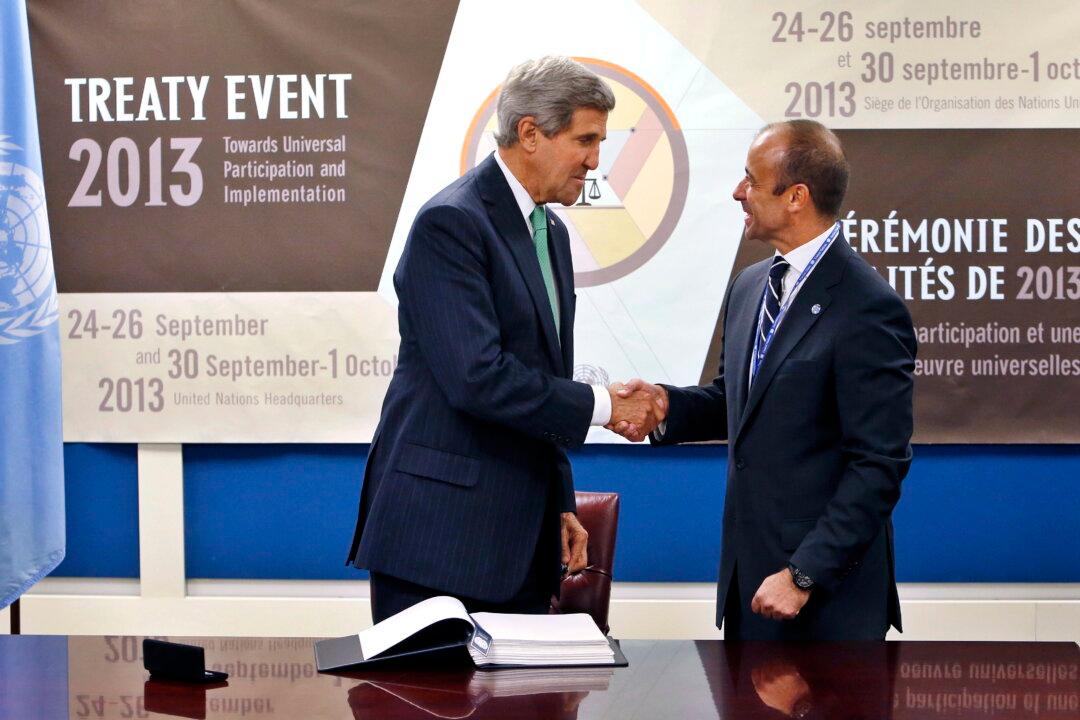OTTAWA — The Harper government faced sharp criticism Wednesday for its continued refusal to sign a landmark treaty to regulate the global arms trade.
A group of non-governmental agencies, called the Control Arms Coalition, said it was frustrated and disappointed that the government did not follow the United States and more than 90 other countries in signing the Arms Trade Treaty.
Meanwhile, the federal NDP accused the government of indulging in conspiracy theories because it continues to express concern that the treaty might have an impact on lawful gun owners within Canada.
The criticism was unleashed after Secretary of State John Kerry signed the treaty on behalf of the U.S. on the sidelines of the United Nations General Assembly.
Kerry called it a “significant step” in keeping the world safe.
And he shot back at political opponents, saying that the treaty would have no effect on domestic gun ownership inside the U.S., where there is strong concern that it could violate the cherished rights of Americans to bear arms.
“This treaty will not diminish anyone’s freedom,” Kerry said, adding that the U.S. “would never think about supporting a treaty that is inconsistent with ... the rights of American citizens to be able to exercise their guaranteed rights under our Constitution.”
Kerry’s view appears to differ sharply from those expressed by the Harper government on the issue.
Foreign Affairs Minister John Baird has said there is a potential link between signing on to the treaty and Canada’s now-abolished long gun registry. His office has said the government is still trying to determine whether the treaty would affect lawful recreational firearms owners in Canada.
“We said we would do consultations before we made a decision on that,” Baird said Wednesday when asked why Canada has yet to sign the treaty.
“Those are in the early stages, so obviously we’re not going to be signing on to anything [prematurely].”
‘Spurious claims’
Critics, however, are growing impatient.
“It is past time for Canada to get beyond spurious claims that the treaty will affect legal Canadian gun-owners and join the states that want to save lives by ending irresponsible arms transfers,” Ken Epps of the group Project Ploughshares said in a statement.
Project Ploughshares is a member of the Canadian coalition, along with Oxfam Canada, Oxfam Quebec, and Amnesty International.
NDP foreign affairs critic Paul Dewar said he was shocked that the U.S., which has a much tougher gun lobby, has signed the treaty before Canada.
“The fact that the government continues to refuse to sign the treaty indicates a preference for conspiracy theories over the simple truth: this is a treaty that will help save the lives of millions of civilians around the world and it has no impact on domestic owners of firearms,” Dewar said in an email.
Robert Fox, executive director of Oxfam Canada, said he was disappointed with the government’s inaction and urged it to sign the treaty without delay.
“We’re in a world where there’s more regulations about the trade of bananas than there are about AK-47s,” Fox said in an interview.
“We believe the treaty addresses their concerns. If the United States can sign on, then it is a mystery to us why Canada would not.”
It is not clear what impact the treaty would have in curbing the global arms trade, estimated at between $60 billion and $85 billion annually. Much will depend on which countries ratify it, and how stringently it is implemented once it comes into force.
The treaty, which will not control the domestic use of weapons in any country, covers battle tanks, armoured combat vehicles, large-calibre artillery systems, combat aircraft, attack helicopters, warships, missiles and missile launchers, and small arms and light weapons.
With files from The Canadian Press





